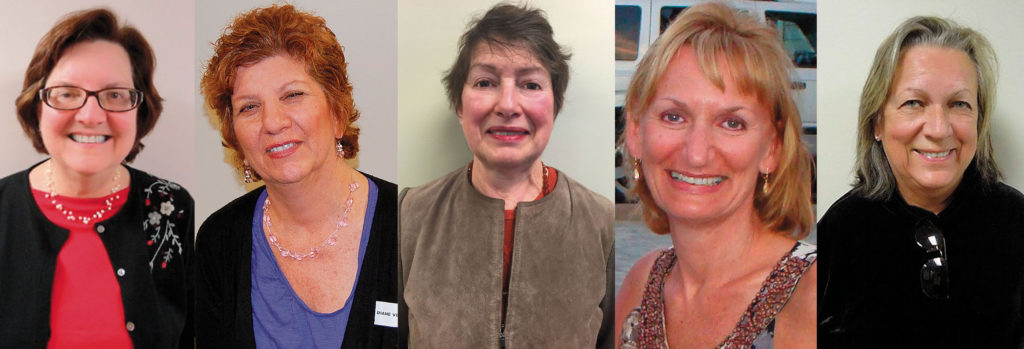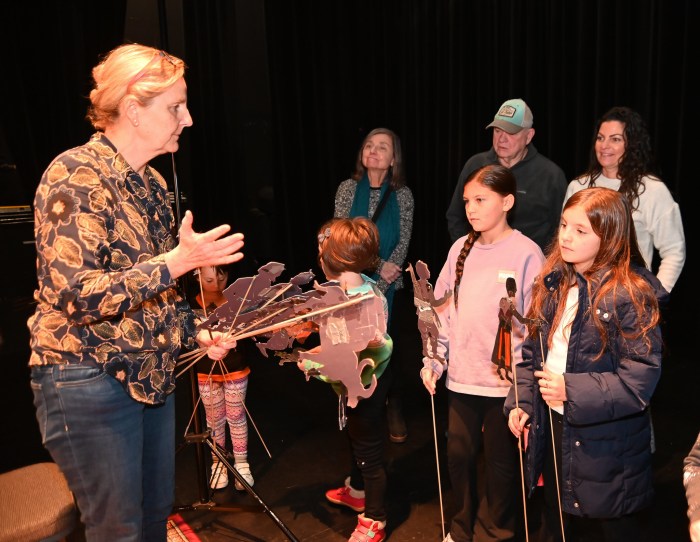For 37 years, the Adelphi NY Statewide Breast Cancer Program has offered New Yorkers coping with breast cancer a place to receive emotional support and valuable advice. Here is some advice from five breast cancer survivors who are volunteers with the program. To reach the hotline, call 800-877-8077.
Make a difference in someone’s life
 Christa Mattey, Garden City
Christa Mattey, Garden City
Breast cancer survivor for 19 years
Hotline volunteer since 2005
“A friend at work who was a breast cancer survivor told me something that really stayed with me and sustained me. She said, ‘I’ve been there. I’m here, I’ve made it and you’ll make it,’” said Mattey. “She gave me hope and that’s what I have tried to do when answering calls to the hotline. Someone calls and she’s really down but after a while, I can hear in her voice that it gets better. ‘Can I call you again?’ she might ask, and my answer, of course, is yes. And when I hang up the phone, I feel better too. I feel I have done something to make someone’s life easier.”
Take it one day at a time
 Maria Troisi Mohan, Manhasset
Maria Troisi Mohan, Manhasset
Breast cancer survivor for 7 years
Hotline volunteer since 2014
“Don’t project, take it one day at a time and keep your head where your feet are,” said Mohan. “Once one has selected one’s caregivers and the protocol to be followed, the very best thing for one’s health and family is to forget about it. Just do it. And the above advice works for me. Compartmentalize and survive.”
Keep focused
 Diane Greene, Plainview
Diane Greene, Plainview
Breast cancer survivor for 19 years
Hotline volunteer since 2000
“When I was diagnosed back in 1998 my two boys were only 7 and 9 years old. While I was terrified at facing my own mortality, my biggest fear was the thought of leaving my children motherless. How would my husband do it alone…would my children even remember me?” said Greene. “Looking at my kids’ little faces, and knowing that they trusted me to be there for them, kept me focused and sustained me through the darkest of days. Together with my husband, we plotted the best path to wellness and forged ahead through every surgery and chemotherapy treatment with our eye on the prize…a long, healthy life together with our children. Now, with high school and college completed…first loves, first jobs and first apartments behind them, my two ‘little boys’ are now men out on their own. And my husband and I are left with the sweet memory of the two young boys whose mere existence gave us the strength to endure our darkest fear.”
Do your research
 Diane Ventimiglia, Farmingdale
Diane Ventimiglia, Farmingdale
Breast cancer survivor for 5 years
Hotline volunteer since 2013
“My life changed forever on May 11, 2012, when I was diagnosed with breast cancer. Who would have thought that while taking a simple shower and feeling a small lump would have such far reaching consequences? Today, five years later, I am happy to say I am well,” said Ventimiglia. “One of the most important things I can recommend is when selecting your teams of doctors is to obtain second opinions and if needed, third opinions on everything. Do your research and become an empowered patient. Do not be afraid to tell your doctors you want to obtain another opinion. Remember, you are the CEO of your body and you need to feel comfortable with your decisions for the breast surgeon, oncologist and/or radiologist. For me I had three opinions for each specialty. Some were single practitioners; others practiced at large well-known hospitals. Some answered my questions; some made me feel rushed. There were differences in the treatment protocols and yes, I questioned each about the differences.”
Ventimiglia also recommends to “write down your questions when you are interviewing the specialists or bring a relative or friend with you to take notes as well. It is normal to feel nervous and scared and you may miss or not hear important information stated by the specialist. Trust your decisions and be an active participant in your healing.”
Support groups can help
 Patti Hogg, Floral Park
Patti Hogg, Floral Park
Breast cancer survivor for 17 years
Hotline volunteer since 2003
“When you receive a diagnosis of cancer, it can put you in a tailspin. Once all the pertinent information is gathered regarding surgery, radiation and chemo, it’s time to seek emotional support. This is definitely one of the most important components in treating the disease,” said Hogg. “Before and during my treatment I had spoken with an Adelphi Hotline Volunteer. She was helpful and reassuring. Shortly after I started my chemo, I noticed a small announcement in a local newspaper that new support groups were forming at Adelphi. I thought I’d give it a try. This was more than sixteen years ago. Our group started with about seven members facilitated by a social worker. We were a diverse mix of women, with different stages of breast cancer as well as different phases and types of treatments. Our weekly meeting was a special time for all of us because even though we individually had support from family and friends, this breast cancer bond was different…and unique. There are four of us who still keep in touch regularly and even though we are only able to ‘meet’ a couple of times a year our bond is special and all because of our Adelphi support group.”
































